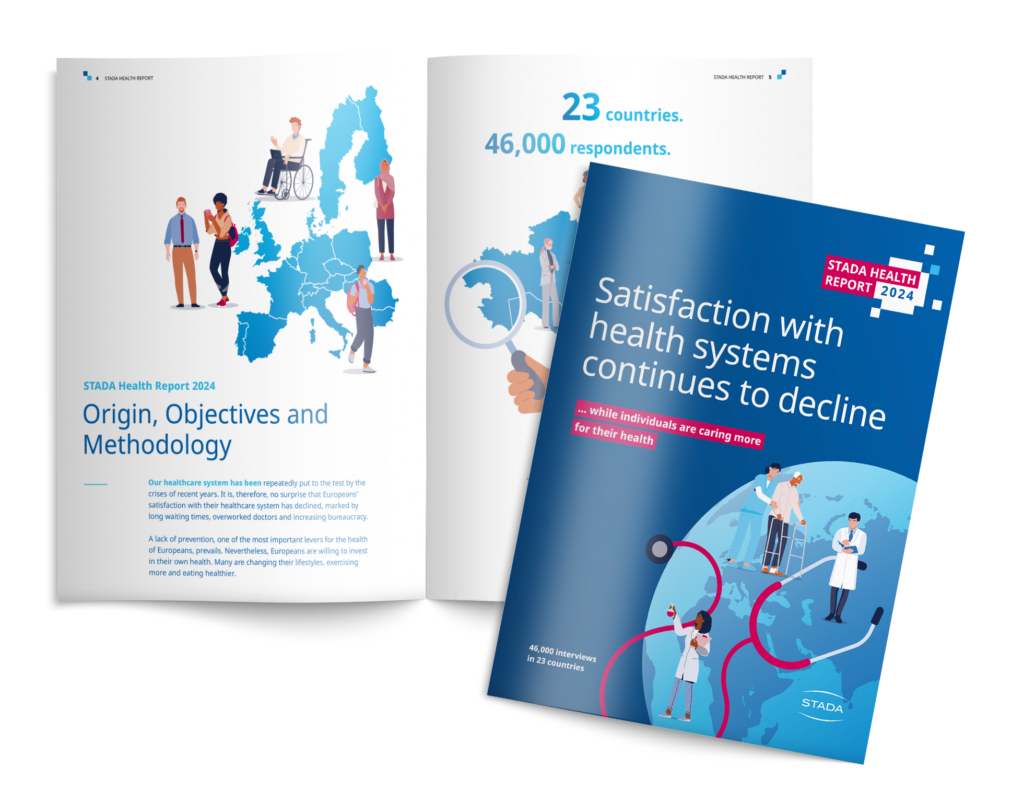Home » STADA survey of patients’ opinions on healthcare

A recent Health Report 2024 survey from pharmaceutical group STADA, the parent group of Irish pharma market leader Clonmel Healthcare, involving approximately 46,000 respondents across 23 European countries, reveals a decline in satisfaction with healthcare systems. The findings, however, cast a very favourable light on healthcare professionals with significant levels of trust among the European and Irish public in their pharmacists with many looking for additional services to be provided in their community pharmacies. This is the first year Ireland has been included in the survey, with 2,000 Irish respondents.
Satisfaction with healthcare systems are at an all-time low with only a 56 per cent (down 18 percentage points since 2020) satisfaction rating among respondents to the comprehensive Euro-wide survey. Key issues include limited access to medical appointments, declining service standards, staff shortages, and distrust in healthcare policymakers. In response, individuals are increasingly adopting healthier lifestyles, engaging in preventative health check-ups, and using dietary supplements, confirms the STADA report.
Less than two in five adults in Ireland (39 per cent) are satisfied with the country’s healthcare system — six per cent very satisfied, and 33 per cent quite satisfied. This puts Ireland towards the bottom of the global rankings, versus a European average of 56 per cent satisfaction. Of the 58 per cent who are dissatisfied, 37 per cent are quite dissatisfied, and 21 per cent very dissatisfied. Just two per cent could not say. Dissatisfaction is far more prevalent in Irish women (68 per cent, including 27 per cent very dissatisfied) compared to men (49 per cent, including 16 per cent very dissatisfied). By age group, dissatisfaction peaks in the age groups between 25 and 54 (all at 63 per cent).
The main reason for dissatisfaction is the inability to get appointments (57 per cent in Ireland versus 54 per cent in Europe), with nearly half reporting experiencing poor standards of care (47 per cent), with women more likely than men to report this (54 per cent versus 37 per cent). 52 per cent of Irish adults have had issues getting a hospital bed, more than twice the European average (25 per cent).
“The main reason for dissatisfaction is the inability to get appointments, with nearly half reporting experiencing poor standards of care, with women more likely than men to report this.”
In Ireland people are more willing to fund healthcare improvements in comparison with their European counterparts, with 52 per cent willing to pay more for better services, significantly above the 42 per cent European average.
Over half (56 per cent) of Irish people want more affordable medication and treatments, compared to 46 per cent across Europe with 44 per cent wanting pharmacies to offer eye and hearing tests, well above the 31 per cent European average.
Almost three in five Irish adults (58 per cent versus 47 per cent European average) want increased pay for medical staff to attract more workers in a bid to improve healthcare systems. Just over half of Irish adults (52 per cent) declared themselves willing to pay more for a better service. This is significantly above the 42 per cent European average.
More than one in four (27 per cent versus 21 per cent average) would be prepared to pay more in taxes and direct contributions to the healthcare system. Men (30 per cent) were more open than women (24 per cent). Another 25 per cent would be prepared to pay more out of my pocket (for example, private insurance or individual service).
The findings are promising for community pharmacies; a majority of Irish adults’ support expanding pharmacists’ roles and services to alleviate pressures on the healthcare system, which suffers from issues like poor access and appointment difficulties.
For instance, 55 per cent of Irish adults support giving pharmacists more responsibility to support doctors, compared to 35 per cent across Europe. Eye and hearing tests in pharmacies are particularly popular, with many expressing a desire to book consultations online and receive medicines via home delivery.
Ireland leads Europe in public trust of pharmacist advice on self-medicating with seven in 10 (70 per cent) Irish adults trusting pharmacists’ recommendations for over-the-counter purchases, higher than the 54 per cent European average. Over half find pharmacists informative (52 per cent versus 38 per cent in Europe). Nearly three in 10 (28 per cent) say such recommendations are “accessible”.Nearly two in five (38 per cent) want the ability to book a personal consultation with a pharmacist online — the European average is just 26 per cent. Around one in three (35 per cent) want home deliveries of medicines (European average 32 per cent).
The vast majority of Irish adults (90 per cent) generally trust conventional medicine (in-line with the European average 89 of per cent) — but nearly half (44 per cent versus 39 per cent) research certain health topics online (question of credible sources).
On reasons for trust in conventional medicines, more than half (56 per cent versus 48 per cent average) trust pharmacists and doctors to know what is best for them. This rises significantly with age, up to 67 per cent in the 55-69 age groups, and 80 per cent in the 70-plus age group. The main reasons for high levels of trust are practitioners such as pharmacists and GPs: 48 percent expressly appreciate their advice, believing that healthcare professionals “know what’s best”. People in Belgium and Ireland hold professionals’ opinions in particularly high regard (56 per cent).
An additional 51 per cent in Ireland say they trust conventional medicine because it has proven effective — second only to Finland (57), and joint second with the UK. But this increases with age, with less than two in five of the youngest 18-34 age group (39 per cent) saying their experience suggests conventional medicines has proven effective.
Preferring homeopathy and alternative treatment preference (11 per cent) was far less popular than the European average of 17 per cent and found absolutely no proponents in the youngest 18-24, or oldest 70+, age groups. Just 12 per cent complained of poor advice from pharmacists, but 17 per cent in the 55-69 age group.
To improve trust in conventional medicine, more than half of Irish adults (55 per cent) want more focus on patient care and demands, a desire that increases with age.
The Irish public are not averse to using technology and digital solutions in healthcare; three in five (60 per cent) are in favour of electronic prescriptions and 54 per cent back electronic patient records, both results are in-line with the European average.
Nearly half (48 per cent) favour apps being prescribed, such as to help reduce stress or mental illness, versus 40 per cent across Europe. One in three (32 per cent) think AI could help pharmacists and doctors, in-line with the European average.
The survey highlights very strong public support in Ireland for expanding the role of pharmacists to improve healthcare accessibility and quality. There is also a notable willingness among the Irish public to invest more financially in the healthcare system, whether through increased taxes, higher pay for medical staff, or out-of-pocket expenses. The findings suggest that empowering pharmacists could be a viable solution to address current healthcare challenges and enhance overall patient satisfaction.

Highlighted Articles